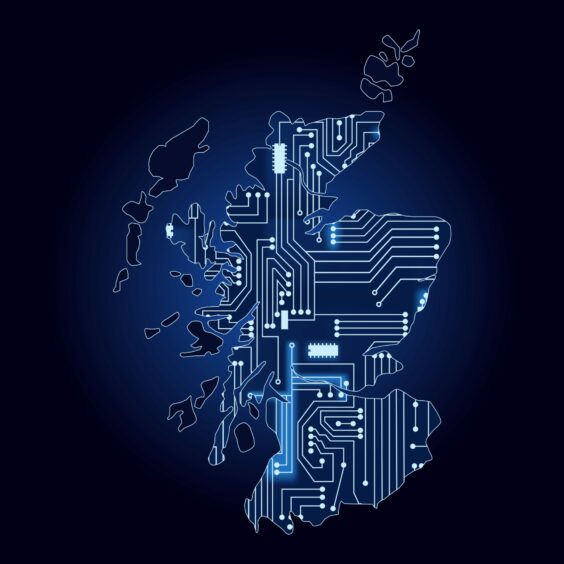Getting Scotland’s relationship right with digital technology and learning is vitally important to securing economic growth.
It is also crucial for keeping Scotland connected and competitive in an increasingly digital world.
The Covid-19 pandemic rapidly accelerated businesses and individuals’ reliance on digital technology and connectivity.
Technology has been essential for keeping the economy afloat, businesses to operate remotely and young people to access online learning.
It has also been critical for keeping people connected with their loved ones.
But what the pandemic also exposed was the need to urgently address the digital inequality that exists in Scotland.
Far too many businesses and communities still lack the ability to access gigabit-capable full-fibre broadband and 5G mobile coverage.
This is holding back growth and hamstringing Scotland’s productivity.
The Scottish Government’s refreshed digital strategy, published last year, recognises the significant challenges and immense opportunities for Scotland in the creation of a truly “digital nation”.
Businesses want to work with government to make this vision a reality.
The north-east already has more than 200 digital technology companies and an aim to grow 10 to 20 of these to a turnover of £20 million per annum.”
Ministers in Holyrood and Westminster should work with business to improve the pace of change by investing in technologies that underpin digital infrastructure, such as artificial intelligence, automation and the ‘internet of things’, while adopting and embedding a consistent digital learning approach across the UK’s education sectors.
Scotland has the potential to further its reputation as a global leader in digital, and build on both the success of Edinburgh as the data capital of Europe and Dundee’s global leadership in gaming.
The north-east already has more than 200 digital technology companies and an aim to grow 10 to 20 of these to a turnover of £20 million per annum, operating on an international basis.
And Glasgow is poised to benefit from the UK Government’s ‘levelling up’ agenda through additional financial support for a new Silicon Valley-style innovation accelerator, which will help to create quality new jobs and boost both the regional and Scottish economy.
Inward investment
Businesses including JP Morgan and Barclays are also making major investments in Scotland’s largest city through the establishment of a centre for software development and modern new art campus, supporting a significant number of technology jobs.
This demonstrates inward investment that wouldn’t happen if the skills weren’t available here.
There are exhilarating examples the length and breadth of Scotland highlighting the potential of digital technology and skills in unlocking economic growth and firmly establishing Scotland as a global leader in emerging sectors such as financial services, life sciences and energy technology, among many others.
Digital isn’t just important to these new sectors though, and having a strong online presence and brand for tourism, food and drink, textile and renewable energy businesses is also increasingly important to showcase the best of Scotland on the global stage.
The Scottish Government’s recently launched National Strategy for Economic Transformation highlights that a focus on digital technology is an essential foundation for economic success.
While businesses are already adapting and embracing digital technology, many of the issues facing Scotland’s technology ecosystem were identified in the government-commissioned review by Mark Logan.
He set out several recommendations on how Scotland could develop a world-class technology sector.
Putting aside the requirement for investment in infrastructure and connectivity, a significant focus was placed on ensuring Scotland has the correct foundational talent pipeline running through every level of the education sector to ensure businesses have access to the knowledge and skills they need, whilst also being able to attract new talent.
Although some progress has been made, it is increasingly important that government works collaboratively and in partnership with business to help increase the capacity of private sector-led initiatives which focus on providing that necessary skilled talent pipeline.
CodeClan, Scotland’s first industry-led digital skills academy has played a critical role in bridging the national digital skills gap.
It has successfully trained a new generation of digital professionals, kick-starting thousands of new careers in technology.
Similarly, global firms including CGI, BT, Microsoft, Cisco and others have been offering digital skills training for managers, business owners and leaders.
Their “digital boot camps” are helping to embed digital learning across Scotland’s economy.
It’s a binary choice and Scotland must change to thrive in the digital world.”
To support digital skills development and assist economic recovery, the Scottish Government should acknowledge the success of CodeClan and CGI in delivering digital upskilling and develop a dedicated single-entry point for access to virtual training and development qualifications.
These could provide opportunities for all workers to upskill, retrain and adapt to technological advances in the workplace.
Business, government and individuals all understand the future is digital.
Making sure we have one of the most advanced digital infrastructures in the world and also the skilled workforce required to capitalise on these opportunities is critical.
It’s a binary choice and Scotland must change to thrive in the digital world.
Liz Cameron is chief executive of the Scottish Chambers of Commerce.





